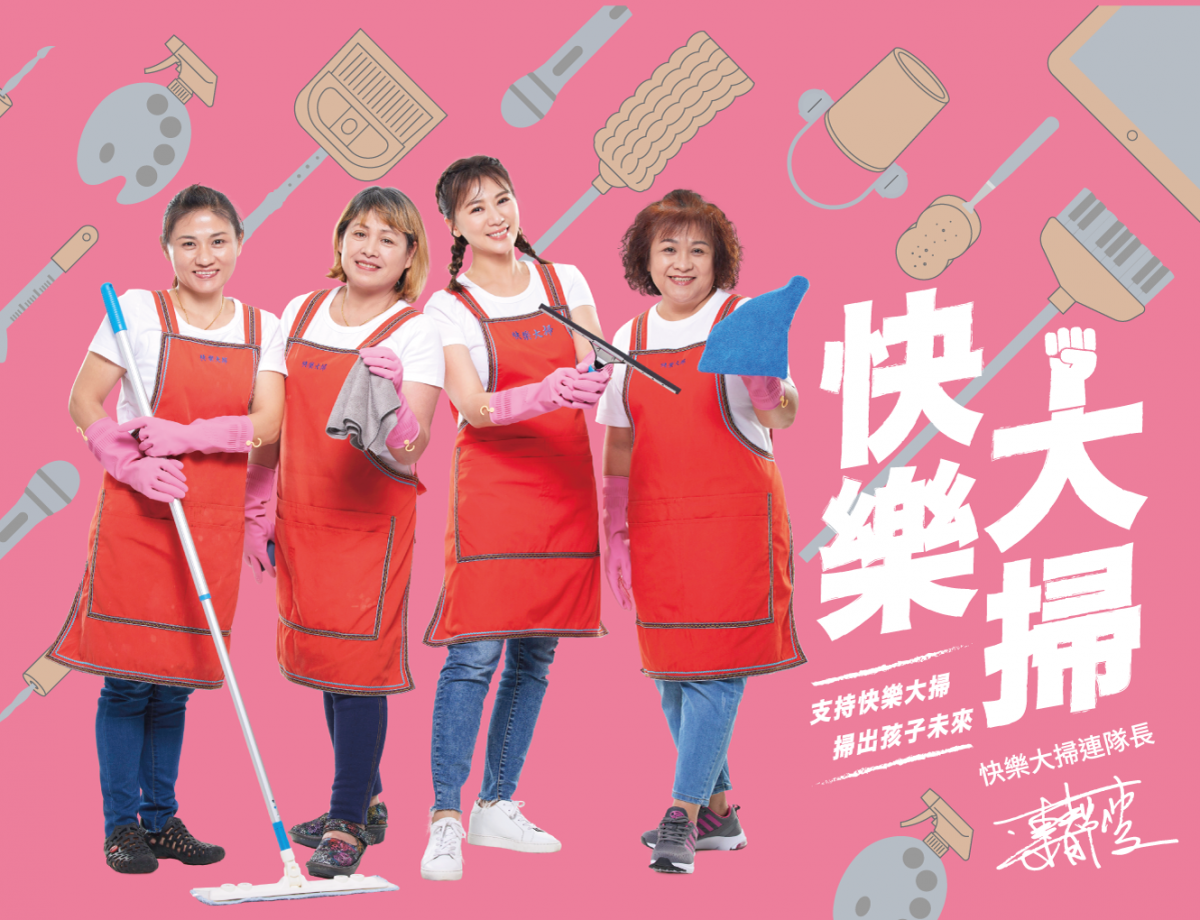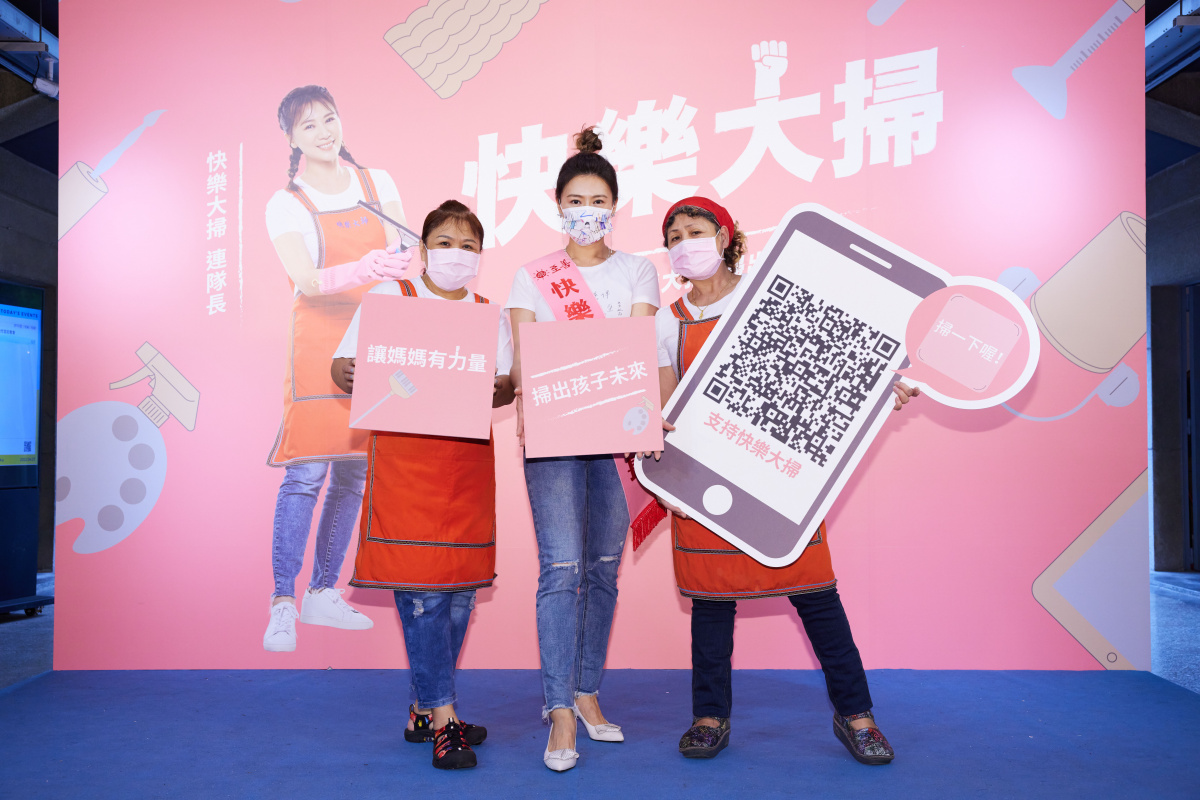Zhi-Shan’s Social Innovation Program “Happy Cleaning”: Empowering Urban Indigenous Mothers, Enabling Them to Break Free from Hardship and Take Care of their Children
【Zhi-Shan Foundation Taiwan News Release 20230427】

For the past five years, Zhi-Shan Foundation Taiwan’s Happy Cleaning program has empowered over 50 urban indigenous mothers in the Greater Taipei area each year to break free from difficult situations in their lives, enabling them to maintain stable households while caring for their children. With an accumulation of successful experiences, Zhi-Shan hopes to expand its services, aiming to empower 100 urban indigenous mothers each year to have stable incomes while balancing childcare responsibilities. Zhi-Shan states that the Happy Cleaning program is designed specifically to create stable income for indigenous mothers. Training and client matching is provided commission free, so all fees paid by clients go directly to the cleaners. To ensure the sustainable development of this social innovation empowerment program, the public's donations and support are sought to help empower urban indigenous mothers in transforming the future of their children through their labor.
According to statistics from the Council of Indigenous Peoples, by 2021, nearly half of the indigenous population of Taiwan had migrated from their original homes to urban areas, leaving their hometowns and seeking livelihoods in metropolitan areas instead of their tribal communities. Urban indigenous mothers find themselves in the corners of cities, lacking support and assistance, often feeling helpless, which in turn deprives their children of stable companionship during their development.
Mr. Jay Hung, CEO of Zhi-Shan Foundation Taiwan, said, "Indigenous families relocating to urban areas often struggle to adapt to the significantly increased cost of living. Indigenous mothers often face the dual pressures of insufficient family income and caring for their families. While they hope to work outside to supplement their family income, they often choose to give up because of the lack of flexibility in working hours, and the unstable income from odd jobs undermines their confidence and even affects their ability to care for themselves, leading to a difficult situation that is hard to break free from."
Understanding these challenges and finding a path to help urban indigenous mothers escape poverty and life's traps was not easy. From changes in government programs to unsuccessful job placement programs, using the accumulated experiences from over a decade of exploration, attempts, and failures, the foundation finally launched the Happy Cleaning Program in 2016. It empowers indigenous mothers through training them in professional household service skills, creating income through a more flexible household cleaning work pattern, which in turn enables them to fulfill their responsibilities in caring for their families and accompanying their children. Since its establishment, the Happy Cleaning Program helps over 50 indigenous mothers each year, enabling them to move from zero income or earning a few hundred NTD a day to having stable incomes and greatly enhancing their livelihood. "Empowering mothers, allowing them to take care of their children, and enabling children to grow up well is the main purpose of the Happy Cleaning program," said Hung.
The professional household services of the Happy Cleaning program have also been recognized by clients in the Greater Taipei area, with satisfaction rates reaching 90% over the years, and a 100% participation rate among team members in courses. "Zhi-Shan's service combines social work and employment counseling, tailoring empowerment plans for each cleaner," said Hung. Indigenous mothers referred to Zhi-Shan or actively contacting them will first be interviewed by professional social workers and then undergo service assessment. Initially, 24 hours of pre-service training and 4 hours of internship will be arranged, and the first three client services matched by Zhi-Shan will be accompanied by employment counselors.
Zhi-Shan has found that urban indigenous mothers greatly need systematic support from partners and groups. Therefore, in addition to arranging course empowerment for household service professionals, it has also developed "Support for Mothers Groups." Through group activities, mothers support each other through various problems they encounter in life. New members can learn communication methods with clients and receive emotional support through exclusive support group activities; if they encounter difficulties during work, they can ask senior members questions through the Happy Cleaning community platform. In addition, monthly householder mother gatherings and three annual educational training courses are held to continuously improve household service professionalism and form a mutual learning and support network.
At the press conference, two cleaning sweepers shared their experiences. Fifty-seven-year-old single mother A-Ching (Puyuma tribe) has three children. To support her family, she had been burdened with credit card debt for over 20 years, accumulating over a million dollars of debt. The debt overwhelmed her, and for many years, she could only do odd jobs everywhere, with no stable income. In 2020, she joined the Happy Cleaning team, diligently cleaning the homes of eight clients every month, earning her a stable monthly income of 23,000 NT dollars. This seemingly meager income provided unbelievable stability for A-Ching, giving her the courage to negotiate debt relief through legal aid, providing her with the opportunity to unlock the shackles of credit card debt and experience unprecedented freedom.

Another member, Jin-Hsun (Amis, now 62 years old) was the first member of the Happy Cleaning team. In her twenties, she left her hometown of Hualien to work in Taipei. She once lived with nine people in a 14-square-meter house, taking care of her young children, elderly mother, and temporary residents. Originally relying on a daily wage of 500 NT dollars to support her family, she joined the Zhi-Shan Happy Cleaning team by chance. The flexible working hours allowed her to fulfill her family responsibilities while stable income enabled her to properly plan her family's expenses, greatly improving the lives of Jin-Xun's family. While she has now lost her low-income household subsidy status and bears a mortgage, she has turned her life around, gaining confidence and a sense of achievement.
Dedicated to charity initiatives, actress Joanne Lien received an invitation from Zhi-Shan Foundation Taiwan and readily agreed to serve as "Captain Lien." Recently, she accompanied the Happy Cleaning mothers to understand the nuances and professionalism of household cleaning. As she observed the mothers diligently and attentively cleaning every corner, she felt pride and admiration as they cleaned with dedication, not considering it a dirty job, and even confidently stating, "I dare to hug any toilet I've cleaned because it's really, really clean!"
Captain Lien expressed sincere gratitude to Zhi-Shan Foundation Taiwan for diligently empowering these urban indigenous mothers as they strive to make a life for themselves in the city by helping them develop professional household service skills and "freely" matching clients, providing them with a source of stable income. “This is truly effective assistance!” She also encouraged all women in difficult situations to "never give up hope and opportunities. No matter what difficulties you encounter, as long as you persist and work hard, you will definitely overcome them!" She also called on the public to donate to support the Zhi-Shan Foundation and continue to promote this empowerment program.
The Happy Cleaning team has full-time social workers and employment counselors responsible for job matching, team counseling, and arranging empowerment courses. Each year, they empower 100 urban indigenous mothers in the Greater Taipei area with professional household cleaning skills and hold regular household cleaning training courses to enhance mothers' professional abilities. To facilitate seamless client matching for the cleaners, a customer relationship management system has recently been established, which can assist in matching clients through the app, protecting the rights and interests of both clients and mothers.
The Zhi-Shan Foundation Taiwan's empowerment program is based on the principle of "creating stable income for cleaners." Training mothers and matching clients do not involve commissions, and all fees paid by clients go directly to the cleaners' income. To ensure the sustainable development of this empowerment program, the foundation hopes the public will donate to support empowering urban indigenous mothers, enabling mothers to accompany their children and provide them with a happy childhood.
